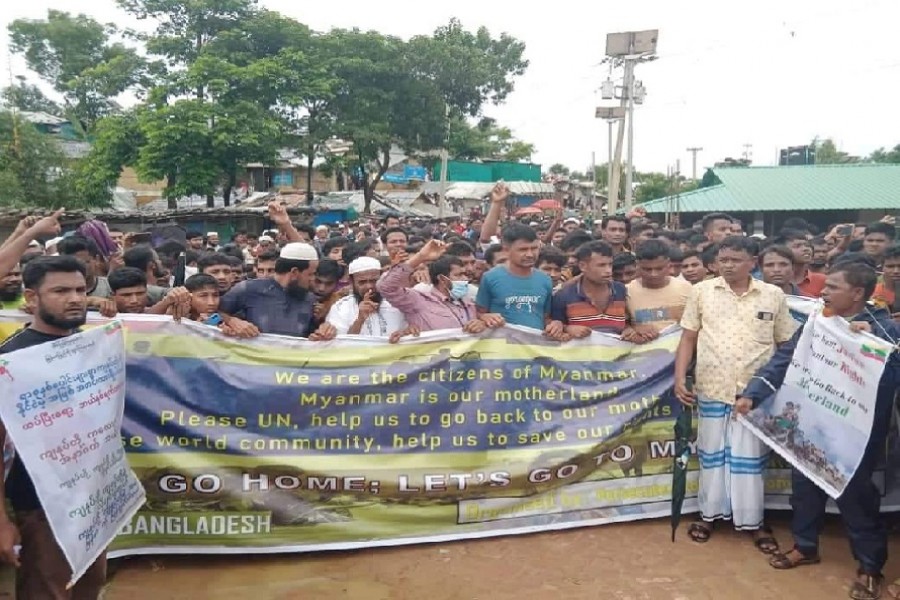Thousands of Rohingya refugees in the camps of Bangladesh have demonstrated demanding repatriation to their homeland Myanmar with basic rights on the eve of World Refugee Day.
“Let’s go home,” the protesters shouted in during the demonstration at Ukhiya and Teknaf in Cox’s Bazar on Sunday. Slain civilian leader Mohib Ullah’s group was among the organisers of the protests, according to leaflets distributed ahead of the protests.
"How many days....? Let's go home, let's go to Myanmar”, “Myanmar is our Motherland”, “United Nations, Please Help Us Go Home”, “We Want Justice, We Want Our Rights”, read the slogans written in Burmese and English on banners carried by the protesters.
They held rallies heavily guarded by law enforcers. The refugees conducted a “Let’s Go Home” campaign to draw support for the protests for some days, the Armed Police Battalion said.
They distributed two types of leaflets with the same message. One of the leaflets bore the names of Dr Toyiub and Md Riaz, members of the Arakan Rohingya Society for Peace and Human Rights, of which Mohib Ullah was the chairman, reports bdnews24.com.
Police have recently pressed formal charges against 29 Rohingya over the 2021 murder of Mohib Ullah. The Arakan Rohingya Salvation Army or ARSA, an armed group based in Myanmar’s Rakhine, murdered civilian leader Mohammad Mohib Ullah because he was working for the repatriation of the refugees from Bangladesh, the investigators said.
Mohib Ullah led a huge rally organised by his group on Aug 25, 2019 to mark the second year of a military operation that forced more than 700,000 Rohingya to take refuge in Bangladesh. Myanmar faces charges of crimes against humanity over the brutal crackdown.
The UN found that the Myanmar military conducted the operation with genocidal intent.
"We're the Rohingya in the refugee camps of Bangladesh who survived a Rohingya genocide," the leaflets for the “Let’s Go Home” campaign read.
Law enforcers and Rohingya leaders said rallies were held at Camp No. 26 and 27 in Teknaf at around 9:30 am. The protesters marched from Camp No. 27 and gathered near the office of the camp-in-charge at Camp No. 26.
“The Rohingya are the tortured Muslims from Myanmar. We’ve been forcibly made stateless people,” said Master Faisal of Camp No. 27.
“Five years have passed since we left our homeland in 2017. How long shall we remain homeless? We don’t want to be homeless and we’re very worried for our future generation. We want to return to our homeland Arakan and live there as legal citizens.”
He said the Rohingya people have been subjected to atrocities, including rape, murder and arson attacks, since 1978. Their villages were torched many times. Myanmar denies the Rohingya citizenship and basic rights.
Faisal thanked Bangladesh for sheltering the Rohingya community on humanitarian grounds. “But Bangladesh is not our homeland. We want to return to Myanmar.”
The demands mentioned in the leaflets include Myanmar citizenship, time-bound repatriation with safety, dignity, security and accountability.
They also demand Myanmar recognise them as an ethnic minority. Buddhist-majority Myanmar calls the Rohingya “Bengali”.
For quick repatriation, they said the stay in transit camps should be short and all the Rohingya must be repatriated village by village.
The UN agencies and countries like the US and Bangladesh must be involved in the repatriation process, the protesters said.
They also demanded that the international community ensure R2P or the Responsibility to Protect in Arakan. R2P is an international norm that seeks to ensure that the international community never again fails to halt the mass atrocity crimes of genocide, war crimes, ethnic cleansing and crimes against humanity.
The leaflets said the Rohingya must not be treated as terrorists, the international media must be allowed in every area of Arakan and the belongings and assets of the Rohingya people, including prawn farms and grazing fields, must be returned to them.


